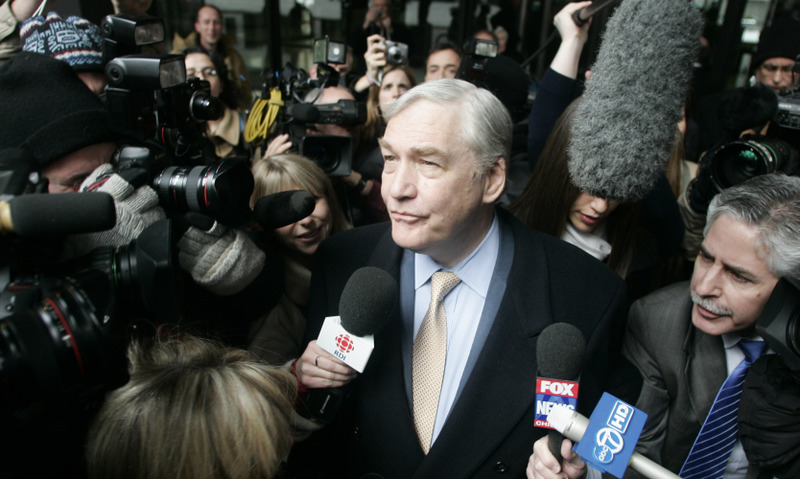By Randy Gladman
Mexican beer company Dos Equis recently ran a wonderful advertising campaign, presenting “The Most Interesting Man in the World”. In these radio and television spots, a dignified, slightly accented, well-dressed, rough yet sophisticated man is described in impossibly exciting detail. “The police often question him, just because they find him interesting. His blood smells like cologne. His personality is so magnetic he is unable to carry credit cards. Even his enemies list him as their emergency contact number. He never says something tastes like chicken, not even chicken. People hang on his every word, even the prepositions. He can speak French, in Russian. He is the most interesting man in the world.” A cursory glance at the life of Conrad Black could lead one to believe that he was one inspiration for the complex character in these clever advertisements.
One of the last true Renaissance men, Montreal-born Conrad Black, aka Baron Black of Crossharbour, has experienced high highs and low lows throughout his illustrious life. As head of Hollinger International, the company that published hundreds of newspapers worldwide including The Daily Telegraph (UK), Jerusalem Post, and Chicago Sun Times, Black held the post of third largest newspaper magnate in the world. Through his ownership of various holding companies, he was involved in many industries including the manufacture of farm equipment, mining, and broadcasting. Perhaps his most lasting creative effort to date was the development of Canada’s daily National Post, a newspaper he launched in 1998.
For most of his life, Black lived a life of luxury and was rated in 2003 as one of the 250 wealthiest people in Britain, where he was raised to the peerage by Queen Elizabeth II who knighted him with a membership in the British House of Lords. Like Icarus, however, Black’s self-made wax wings began to melt as he soared too close to the sun. By July 2007, he had been convicted of mail fraud and obstruction of justice in the Illinois US District Court. Sentenced to 78 months in federal prison, Black is currently incarcerated in the Coleman Federal Correction Complex near Tampa, Florida.
As the saying goes, you can’t keep a good man down, and Black has continued an intellectually active and decidedly productive life regardless of his present circumstances. A published author of biographies of great personalities from history such Maurice Duplessis, Franklin Delano Roosevelt, Richard Nixon, and himself, Black continues to contribute regular editorial opinion pieces to the National Post (a wonderful example of which presents his comparison of cats and dogs) and has published history and criticism articles in a variety of other publications since his incarceration. He continues to work hard throughout his days, writing, communicating via email, and teaching English and the history of the United States to fellow inmates. Considered a “low risk” prisoner, he has practically unlimited access to emails, and the media, and plenty of time for visitors. In an article published in Spear’s Wealth Management magazine, he said his current life is “a little like going back to boarding school, which I somewhat enjoyed, nearly fifty years ago (before being expelled for insubordination), and is a sharp change of pace after sixteen years as chairman of the Daily Telegraph.”
The inquisition that follows was conducted by Randy Gladman via email in May 2010. Conrad Black, Federal Bureau of Prisons inmate # 18330-424, is scheduled for release from Coleman Federal Correction Complex in October, 2013. We expect Baron Black of Crossharbour will be enjoying a cold Dos Equis shortly after he gets home.
1. Which historical epoch would you most like to have participated in? (ie. Ancient Rome, Revolutionary France, 1960s Counterculture…)
Twentieth century.
2. If you could live as one historical figure for one month, who would it be? (Feel free to describe which particular month, if relevant.)
Jesus Christ, the month ending a few days before he died. Or Napoleon in 1803, at the time of the Treaty of Amiens. That would have been the time to end the Napoleonic Wars and avoid the nonsense of the Empire.
3. If you could be internationally famous for any achievement, real or imagined, what would it be for?
A timelessly influential book, like Adam Smith’s The Wealth of Nations.
4. Do you think it is better to be exceptionally intelligent with average charm or exceptionally charming with average intelligence?
The first.
5. Which 3 visual artists do you most admire? (For their work and/or the manner in which they lived their lives)
Michelangelo, Leonardo, Monet.
6. Which 3 musicians’ music most closely resembles a soundtrack to your life?
Wagner, Beethoven, Verdi (everything is to scale).
7. Do you listen to music when you are being creative? What music? If not, why not?
Yes. Beethoven, Mozart, Wagner, Chopin, Faure, Sibelius, Bach.
8. If you could change one significant aspect of your talent, what would you change?
I would be more naturally musical.
9. What three cities would you most like to live in?
New York, London, and Paris.
10. Imagine you are driving on an open, gently curving highway with a guarantee of no police, no other drivers, and perfect weather conditions. What kind of car would you want to drive and how fast would you go? Is there a particular stretch of road you have in mind?
A Bentley Continental, about 70 mph, between San Francisco and San Luis Obispo, Quebec City and Tadoussac, or on the upper Corniche between Monte Carlo and St. Jean-Cap-Ferrat.
11. Which current global calamity would you fix with one all-powerful wish? (ie. global warming, HIV/AIDS, starvation, …)
Terrorism.
12. If you could solve one of the great mysteries humanity has never been able to figure out, which would it be?
The existence and nature of God.
13. Do you believe the United States of America is getting better or worse?
Worse.
14. What is your favourite film of all-time?
Richelieu, starring George Arliss.
15. What is your favourite restaurant in the world? (Please name the city, too.)
Mark’s Club, London.
16. What job would you least like to do for 40 hours a week until retirement?
Cleaning public washrooms.
17. What superpower would you find most useful? (Flying, invisibility, indestructibility…)
Indestructibility.
18. Have you ever been in a fist-fight in which blood was spilled? (Feel free to offer a brief description.)
Yes, a few bloody noses, given and received, when I was in elementary school,m especially playing hockey.
19. Do you have any phobias? (Feel free to explain which ones.)
No.
20. Do you think it is better to ask for permission or beg for forgiveness?
The first.
21. If invited to travel on the next NASA space shuttle mission, would you go, knowing that statistically there is a 2.52% chance that you would die (126 missions so far, 2 disasters)?
No, not out of fear but because the preparation would be too onerous.
22. What is humankind’s single best invention?
The wheel.
23. If you could clone a human, would you and who would you clone?
Abraham Lincoln.
24. What is your favourite toy from your childhood?
A little metal model of a pre-war Lagonda convertible.
25. Which news media sources do you most trust? (Please list up to 3 sources)
Wall Street Journal, Economist, Commentary.
26. Which corporation do you think has had the biggest positive effect on the Earth and/or mankind? Which has had the biggest negative effect?
IBM; no opinion.
27. Do fully developed ideas pop into your head or do they develop slowly with effort?
Both.
28. Do you believe in reincarnation?
No.
29. If given a choice for your next life, do you want to be a man or a woman? (As with all these questions, answering “why?” is optional.)
Man, I would know better how to do it.
30. If you could pick, as which animal would you choose to live your next life?
Human. If it had to be another animal, I suppose a whale, the largest kind.
Introduction and Inquisition by Randy Gladman, originally published on Akrylic.com, May 16, 2010


